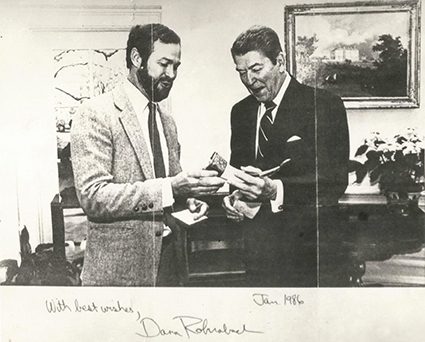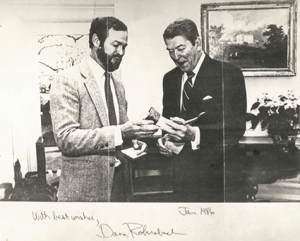Memories of Socialism
Alittle over 30 years ago, when the Soviet Union was still alive and kicking and the socialist agriculture sector was still functional, very successfully too, a black Volga with government license plates rolled into the celebrated village of Shroma in Guria, marked with distinguished popularity throughout the Union. A secret service agent got out of the car and enquired after the Chairman of the local collective farm, the famous Mikhako Oragvelidze. He brought out a black-and-white photograph which in the center showed Dana Rohrabacher, the now incumbent republican member of the United States House of Representatives, who had served as a speechwriter and special assistant to President Ronald Reagan from 1981 to 1988, and Mikhako Oragvelidze. The photo, labeled USSR, Georgia, Ozurgeti, Mikhako Oragvelidze, from Ronald Reagan, White House, Washington in a hand-written note by Curt Weldon (today’s member of the House of Representatives and then aide to the American President), depicted the handing over to the American president of a Qhantsi, a horn drinking vessel.
Recently, and accidentally, I ran into Oragvelidze’s grandson in Tbilisi, who told me this story, and later kindly supplied me with those historical photos. The story has it that in 1986, a high-ranking delegation from the US visited Georgia and the American President’s mentioned aide had an encounter with the amply decorated Georgian rural leader Mikhako Oragvelidze, who had actually achieved outstanding results in the farm activity of those times, having become an epitome of farming accomplishments which made him the foundation of the socialist idea of people’s well-being. The country itself was certainly poor, but it seems that flashes of occasional economic triumph were still seen. Those examples of success were usually generalized by the communist leadership to perpetuate the thought that socialism was not a historical mistake and that it made sense to continue working on it. This was exactly the reason the prominent American and other foreign guests were shown around the farms and enterprises which deserved the attention of curious foreigners. The entire idea was to prove to the world that in the fierce Cold War competition, socialism prevailed against capitalism, thus justifying the monstrous and almost moribund soviet economic and political experiment.
But whatever it was, good things were happening, too, at least on the level of regular human interaction. The encounter between the capitalist American Dana Rohrabacher and the soviet Oragvelidze was the example of that possible benevolence between the diametrically different systems, which practically meant a chance to maintain peace in the world. People were people and they wanted to love each other and to cooperate somehow. As I was by Gia, Mikhako’s grandson, he was a kid when his powerful and famous grandpa asked him to bring out his favorite drinking vessel Qhantsi, which was then filled with the typical Gurian wine from the endemic Isabella vine. The jovial and gregarious Gurian host, who clearly exuded a regular human happiness, a sense of the achieved well-being and a pride for socialist content, made a toast to peace, drank the horn dry and gave it to Dana to toast to peace in the same way. After this, the host requested the guest to give the horn to Ronald Reagan when he returned to America, and to ask the President to drink a toast to peace in the world as they had just done.
Imagine that the request was respectfully fulfilled and Ronnie accepted the Georgian souvenir and drank from it, too- wouldn’t that be marvelous? I believe that encounters like this can really make peace and cooperation between the peoples of the world, be it during that strange period of socialism or the tough times of capitalism. Reagans, Gorbachevs and Shevardnadzes –all of them just need to talk it out and work with (and like) men like Mikhako, notwithstanding their current political credos.
Mikhako Oragvelidze was a man who created a good life for his community, whatever the understanding of ‘good life’ was at that time. He was a kind, astute and hardworking man, standing next to his people both in bliss and need. He was a good leader, and good leadership works anytime and anywhere, in the life of any nation.
Nugzar B. Ruhadze












